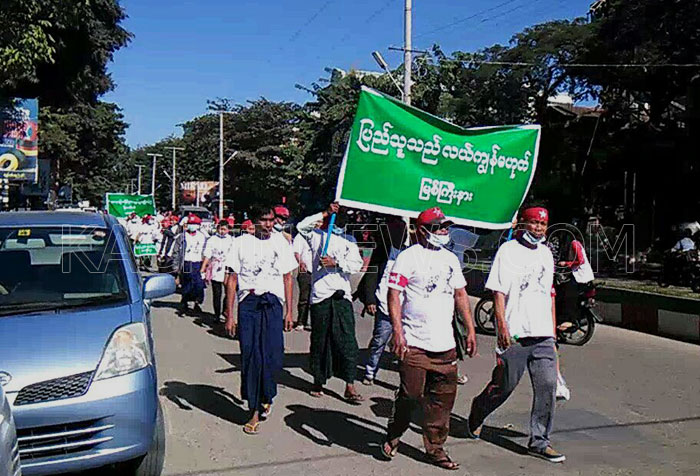About 150 people including representatives from Community Based Organisations (CBOs) and farmers held a protest march against the Draft National Land Use Law on 28th November in Myitkyina Township, Kachin State.

The march was held between 9am and 11.30pm and went from Mandalay Monastery to Setarpu Bridge. According to Dr. Maung Maung Tar, the chairman of a rubber business owners’ organization and a protester a workshop on the Land Use policy was held at a church in Aung Nan Ward in Mytkyina on 27th November and a statement on the policy was issued.
He said: “We discussed the government’s draft National Land Use Policy yesterday and concluded that it does not support the people, which is why we are protesting.”
Farmers’ representatives from Myitkyina, Hpakant, Mohnyin, Mogaung, Tanai, Waingmaw, Namti in Kachin State protested by holding placards voicing their opposition to the draft National Land Use policy, he said.
Daw Bauk Jar, a farmers’ representative and member of the National Democratic Front (NDF), told Kachin news: “We do not want this draft law. People and farmers who have lost their land did not know this law was being drawn up. It does not benefit people and some people will even have their land confiscated by this law, which is why we do not accept it.”
She said that they also objected to the law because it states that the Union Government owns all natural resources and if it wants it can legally seize any kind of land from the people who are entitled to use it.
U La Sai from Hpakant township farmers group said that the protesters all wore tee shirts with photos of Saya San, who led a revolt for farmers’ rights against the British during colonial times, on the front and quotes about farmers’ rights from farmland activists in Kachin State printed on the back.
He said: “We held placards saying ‘We Do not Accept Land Confiscation’, ‘We Do Not Want a Centralised System’ and ‘Rights for Farmers’ as we marched around the township.”
The statement issued after the 27th November workshop said that though the draft law claimed centralisation would be decreased district and township officials would still be appointed by more senior authorities, so it could not be accepted. It also pointed out that previously land laws had not covered land traditionally used by farmers but that the new law would cover such lands and would not guarantee people’s rights to such traditionally used lands and would not give them the freedom to manage and use such lands how they want.
It also said that because the draft law did not guarantee ethnic nationalities land ownership and the rights to freely manage their land it might hinder the process of peace and national reconciliation. Also the draft law did not address the issue of land grabs made by the government during the years of military rule or current land dispute issues.
There was also insufficient consultation and the law was only explained in 17 places, including Naypyidaw, over 15 days, which meant that it ignored the wishes of ethnic nationalities and farmers.
The statement said that the law should be transparently drawn up with participation from the people, farmers, parliamentary representatives, CBOs, ethnic leaders, women, youths and lawyers.
Translated by Aung Myat Soe English version written by Mark Inkey for BNI



